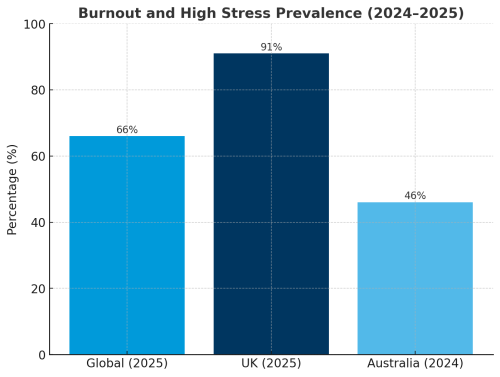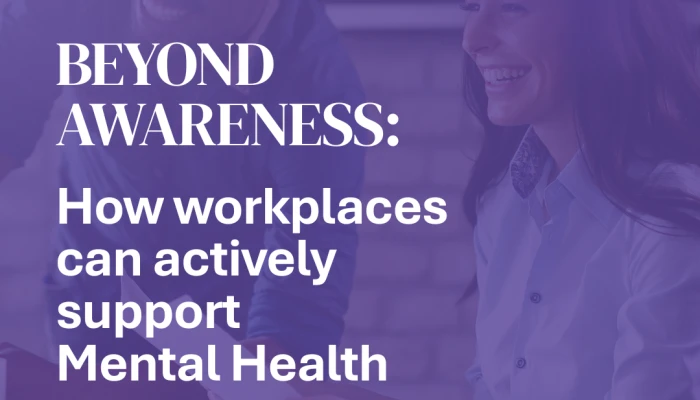Burnout in 2025: What the data really tells us
Stress, burnout and resilience are more relevant than ever. Understanding how they work, and how to build resilience, is essential for creating workplaces where temas thrive, not just survive.
The physiology of stress
Stress is a natural biological response to challenge or threat. Hormones like cortisol and adrenaline are released, preparing us for action. This acute stress can enhance performance - sharper focus, faster reactions, more energy.
But when stress becomes chronic - ongoing demands with little rest - it overloads our systems. Elevated cortisol over long periods impairs sleep, weakens immunity, disrupts mood regulation and contributes to fatigue, burnout and emotional exhaustion.
Recent data: how bad is burnout now?
In the UK, the Burnout Report 2025 (Mental Health UK / YouGov) found that 91% of adults reported high or extreme levels of pressure or stress in the past year, with nearly two-thirds of workers saying they are concerned about burnout in 2025.
Among University staff in Australia, very high psychosocial risk increased from 26.6% in 2020 to 39.6% in 2024, with up to 77% of staff now reporting high-risk conditions that contribute to burnout.
Globally, around 25% of employees report persistent burnout symptoms, including chronic fatigue, cynicism, or reduced effectiveness.
In Europe’s IT sector, 73% of professionals cite burnout or work-related stress amid rising workload and skills shortages.
These figures show that burnout is not just about individual capacity - it's rooted in organisational pressures, systemic issues and the changing nature of work.
Recognising burnout: signs & symptoms
Burnout goes beyond feeling tired. Key indicators include:
- Persistent fatigue, sleep disruption or energy depletion
- Increased cynicism, detachment from work or colleagues
- Reduced capacity to perform well, lower productivity or motivation
- Emotional exhaustion and more frequent negative thoughts or mood swings
- Physical symptoms (headaches, digestive issues, elevated heart rate)
The trick is to spot these early, before they cascade into more serious physical or mental health issues.
The impact on mental health & organisation
Burnout doesn’t just affect the person experiencing it; the effects ripple out:
- Risk of mood disorders (depression, anxiety) is much higher.
- People with burnout are more likely to take sick leave, be less engaged and consider leaving their job.
- Costs accumulate: reduced performance, staff turnover, healthcare utilisation, absenteeism.
Recent findings:
- 25% of employees worldwide report symptoms of burnout; burnout is strongly linked to lower confidence in work performance.
- In the UK, young workers (18-24) are particularly impacted, with high rates of stress, time off and pressure.
- In Australia, 46% of employees reported experiencing some degree of burnout.

Building resilience: evidence-based strategies
Resilience isn’t just bouncing back, it's adapting, growing and maintaining wellbeing even under stress. Here are strategies with research backing:
-
Mindfulness, reflection & emotional regulation
Practices like mindfulness meditation, expressive writing, or breathing exercises help regulate stress response. Emotional agility (being aware of what you feel and why) reduces reactive stress and supports decision-making. -
Setting boundaries & recovery periods
Adequate rest, including good sleep hygiene, breaks during work, off-time after intense periods are all critical. Encouraging teams to take regular mental health check-ups, even when things seem “okay.”
Psychosocial safety & cultural norms
Organisations with higher psychological safety (where people feel safe to speak up, help each other, share stressors without fear) report lower burnout, higher trust, better retention.
Resilience & adaptability embedded in practice
Training people not just to “cope” but to adapt - flexibility in work, clear communication in change, teaching growth mindset and helping people learn from setbacks.
Structural interventions
Reducing workload where possible, ensuring adequate staffing, fair expectations, giving leaders tools to monitor stress and intervene early. Using data to identify high-risk teams and adjusting policies accordingly.
What can Enmasse help you do now?
At Enmasse, we support organisations to shift from reaction to prevention. Here's how:
- Resilience workshops: interactive sessions to build individual and team capacity.
- Leadership coaching: helping leaders identify burnout risks, model healthy behaviours, cultivate psychological safety.
- Behaviour Change Hub: short, clinically-validated e-learning modules covering stress, boundaries, mental health literacy.
- Culture audits & consulting: assessing your current culture, metrics and systems; designing interventions that reduce burnout risk.
Why resilience matters now
Burnout isn’t going away. As work changes, expectations grow, technology accelerates and global uncertainty continues, resilience becomes a competitive advantage - not a bonus.
Understanding stress, recognising signs early and building resilience isn’t just good for people; it's essential for performance, retention and workplace health. Contact us today to see how we can help support you and your teams.
References:
Mental Health UK & YouGov. (2025). Burnout Report 2025: Pressure and stress in UK adults. Mental Health UK.
Beyond Blue & Australian National University. (2024). National Survey on Psychosocial Risk Factors in Australian Universities.
Robert Half & Information Age. (2024). Burnout among Australian office workers.
Forbes. (2025). Global burnout crisis: 66% of workers report symptoms.
Statista Research Department. (2024). Burnout among employees worldwide 2020–2024.
Eurofound. (2024). European Working Conditions Survey: IT sector burnout and workload.
World Health Organization. (2024). Mental health in the workplace: Policy brief.
McKinsey Health Institute. (2024). Addressing employee burnout and building resilience.
Harvard Business Review. (2023). What resilience means, and why it matters at work.


